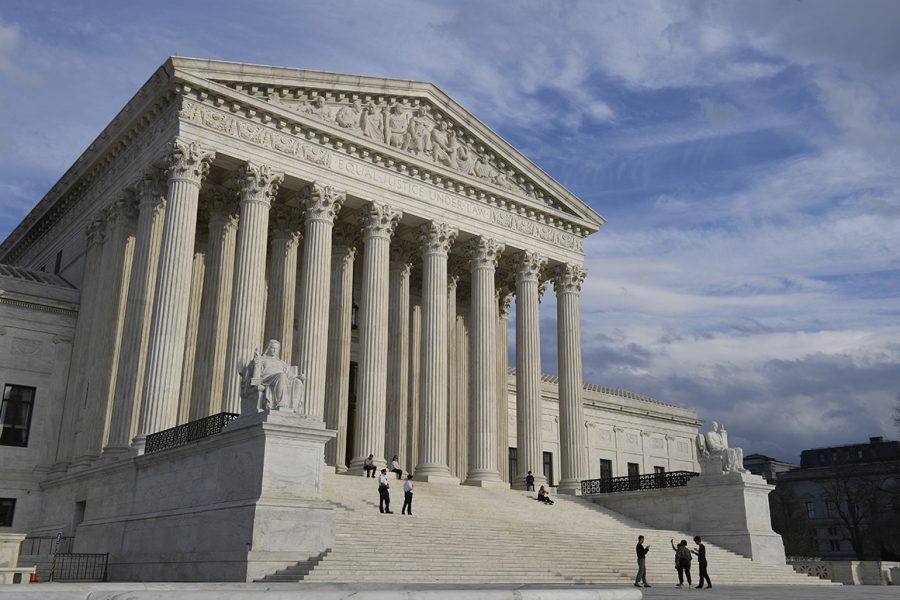Supreme Court’s Vaccine Mandate Decision and its Implications
The recent Supreme Court decision to overturn Pres. Biden’s private business vaccine mandate sparked controversy.
January 19, 2022
By now, it is a simple truth that many Americans – as well as the vast majority of Villanovans – are tired of constant societal restrictions on behalf of a seemingly endless pandemic. While I believe the concern was warranted at the start of the pandemic, once vaccines were widely available and more information was gathered as to who is most vulnerable from the virus, there was simply nothing more that could have been done on a public policy level.
Despite a growing number of Americans accepting this fact and wanting to carry on with their everyday lives, President Biden decided to take aggressive action by issuing an unprecedented vaccine mandate on the private sector. However, due to opposition from various different companies as well as certain states, the Supreme Court ruled on Jan. 13 to block Biden’s vaccine mandate.
The Court’s 6-3 decision not only spells a major victory for millions of employees across the country but also shows that our institutions remain resilient even in the face of heavy external pressure.
I believe that this decision was the correct conclusion based on the current given facts surrounding the pandemic and the disastrous effects this could have on an economy that is already suffering due to inflation and labor shortages.
The 1970 Occupational Safety and Health Administration law that the three dissenting justices have cited as justification for the mandate only allows for workplace safety standards against occupational hazards, not very broad public health measures such as this one, which need the authorization of Congress. Thus, the six approving justices expressed that while OSHA does indeed have full authority to require safety measures such as the wearing of a helmet or other protective equipment for projects that pose more physical risk, it does not have justification to require vaccines as the pandemic is a risk present both inside and outside the workplace.
In addition, the emergence of the Omicron variant has completely dismantled any rational argument in favor of the mandate. The whole purpose of Biden’s mandate (which was already very dicey when it was first issued) was to stop transmission of the virus from unvaccinated to vaccinated employees. However, it is apparent that this new variant does not discriminate as now both the unvaccinated and vaccinated are getting Omicron at relatively comparable rates.
Even the nation’s leading infectious disease expert Dr. Anthony Fauci has admitted that “Omicron, with its extraordinary, unprecedented degree of efficiency of transmissibility, will ultimately find just about everybody” regardless of vaccination status.
Even during the height of the Delta variant, breakthrough cases had been fairly minimal and mild. Omicron cases, too, have been overwhelmingly mild, particularly for the vaccinated and those in the younger demographic. Why, then, is there an urgency to promote vaccine mandates that would prove more detrimental to the economy and the everyday lives of Americans who were in fear of losing their jobs over their public health decisions?
The answer lies in the constant mixed-messaging about the pandemic from both the media and the current administration. Perpetual fear-mongering and vaccine hesitancy led many to panic over the virus despite having had the tools to get back to daily life since March of last year.
One question raised by Supreme Court Justice Amy Coney Barrett that has been on my mind is, “When does the emergency end?” There has to be some sort of limiting principle in order to return to normalcy. However, this mandate proves that there is no such principle at play, even as President Biden admitted last month that there is no federal solution to stop Omicron and it is up to the states to act.
The Supreme Court was not designed to favor personal points of view but rather interpret the law as it is written. I do not believe that this decision undermines the vaccines in any way as some have suggested, as all of the justices on the court are fully vaccinated and have deemed numerous state-issued vaccine mandates appropriate over the past few months.
Rather, this mandate was struck down due to the fact the Constitution makes clear that public health falls under the jurisdiction of states and certainly not the federal government, much less without the authorization of Congress. This is not even a partisan issue as even the Senate voted 52-48 on Biden’s vaccine mandate for the private sector, a majority of the U.S. Senate.
The Court’s decision should be a sigh of relief not just to those in fear of potentially losing their jobs but also for all American people. Regardless of political leanings or personal beliefs, Americans should be proud that our Supreme Court has proven durable in the face of heavy pressure. This decision shows that despite the skepticism from both sides of the aisle, the country’s checks and balances remain effective and fulfill their intended purpose.


